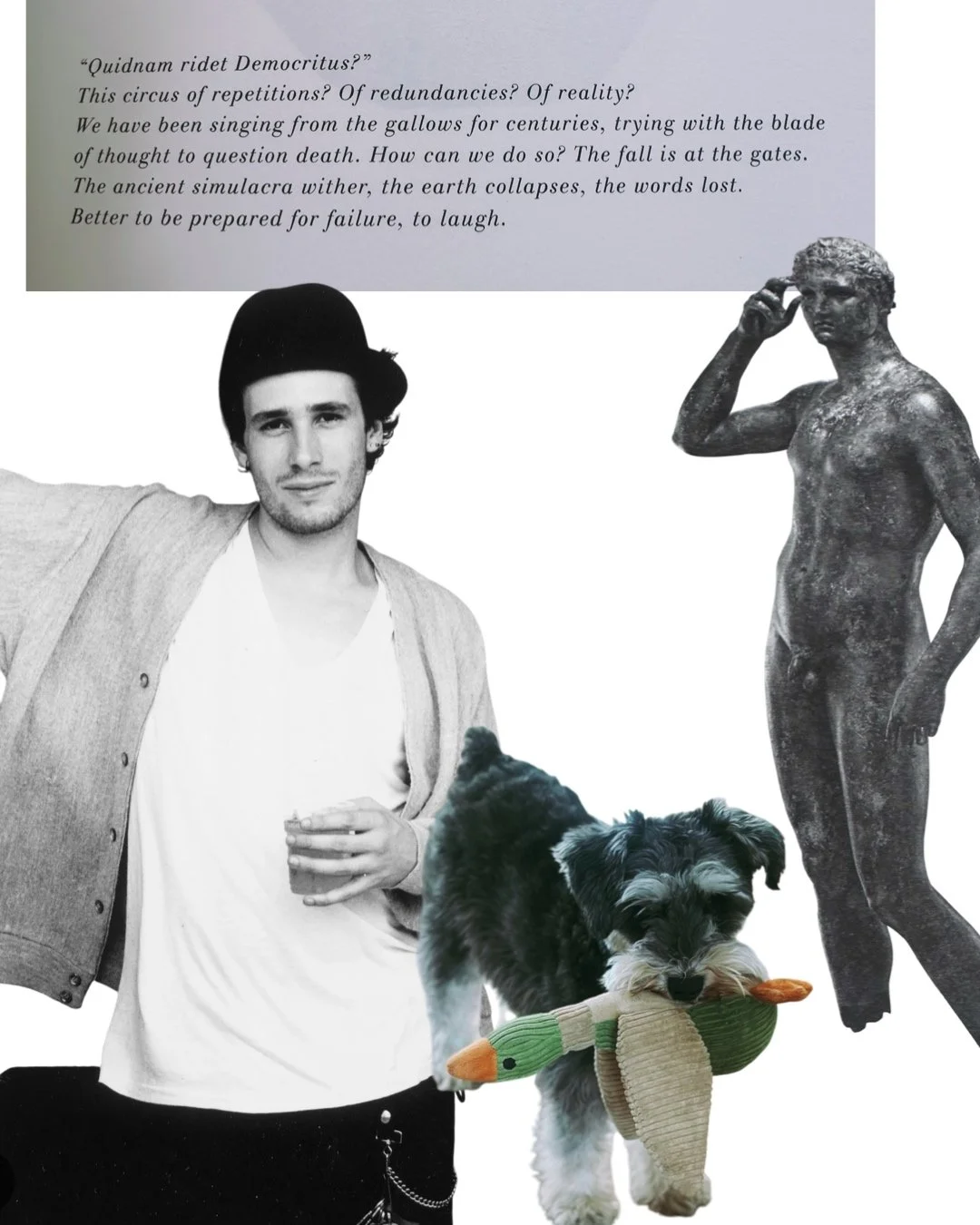Citation performs the social gestures that characterize kinship as a practice . . . in which the doer of the kin function becomes kin by virtue of the act.
– Alex Brostoff, “An Autotheory of Intertextual Kinship”
I buried my face but it spoke once again
The night to the day we're a bindin',
And now the dark air is like fire on my skin
And even the moonlight is blinding
— Townes van Zandt, “Rake”
1
i hadn't thought about what it was going to be in fort wayne that i should address
or how.
— David Antin
Part of our contemporary emphasis on visibility and “being seen” is commercial— the language of brands and selling, of becoming a desirable product and creating a “buzz.” Nothing kills the buzz of writing more than the humiliation of marketing pressures and the emphasis on “going viral.” Nothing is lonelier and less real, less true to its selves.
Visibility, of course, depends on symbols, on status-markers and various conventions that ‘code’ a human being as good/bad, relatable/weird, exemplary/horrid etc etc etc. We are expected to ‘read the room’, as if reading others is something any of us are actually good at. I’ve often said that I feel more like myself on the page than in person. When I lean against that statement by trying to locate its gist, there is simply the feeling that I would rather be misread in my words than in my body. I would rather be misunderstood by something I’ve written than by something I resemble or represent. But maybe the whirlpools are more complicated.
To ‘read’ is to make sense of what is legible. And legibility overdetermines the author's presence: you read me as mother, wife, citizen, words that authorize me to speak on the basis of socially recognized roles. Each role has its status. I want to contest the narrow throat of the vase in which my availability renders Me legible to You.
“To recognize another text as ‘kin’ intimates a relation that exceeds influence, one that personifies a textual relationship to flesh-and-blood bodies,” writes Alex Brostoff in “An Autotheory of Intertextual Kinship.” So, the intersection of the song with the poem that inspired it becomes a site where language creates an alterity, an Other that is real under the conditions where those words are read, spoken, inhabited.
What Brostoff calls “representation of ambivalent bodies” pertains to bodies that exist between and around rather firmly ensconced in commitment to their located demographic categories. Queer theorists continue to stand in this space of possibility for me, and the possibility is real. It is, for me, a livable reality.
I drag around the debris of intimate citations and texts just in case a wind should appear to create an unexpected shape from it. The wind might orchestrate a new way of seeing that is pummeled from the pressure of daily life, a pressure that includes being in the world among others and longing to be with them rather than merely among them.
So there is the heap of books, the detritus of junk my brain collects and consecrates through memory, and there is also the internal friction generated by temporality, or the harassment of differing tenses. I can’t reconcile that. I can’t amend or fix or bridge those essential (and essentialized) distances. But I can study what just may happen if they interpellate each other accidentally.
To prevaricate and intervene by conducting a close reading which admits its debt to uncertainty, and its construction as a reading, developed under pressure and in relation to circumstance, which seeks to uncover a body in the traces or imprints left by others. A body may be a photo, a text, an object, a place, a scent—any trace, any sensory clue . . .
2
Yesterday was very difficult. That may or may not be legible from photos. That may or may not have a legible context to the reader. It depends on how much we think we know— and how terrible we are at admitting that knowing others is difficult precisely because no human is a settled object, a knowable thing, a finished product.
3
When Jeff Buckley said “I love everything that haunts me and never leaves…” — he was speaking of this intertextual kinship, of muses and musings which happen to be the gift and the curse of those who create art, the books and authors that have been kinder than kin to us, the young writers who at this very minute is sitting on a bench somewhere, grappling with their inability to forget the ways the world touched them. I hear, in Buckley’s words, the way I am haunted by Paul Celan, Benjamin Fondane, and Gherasim Luca— the way I am haunted appears in my words, my texts, my efforts to free myself from the shadows who raised me. It is simpler to admit that I abide in Them. My eye for their eyes; my first-person pronoun for Theirs. We are all creatures of influence; no one is ‘self-made’. That’s just the lie commodity culture sells us in order to further alienate language from the complexity of its relational nature. But it’s also the lie we buy and sell. It is the most American lie of all, a poison rich on the lips of neoliberals.
Truly, now the dark air is like fire on my skin
And even the moonlight is blinding



